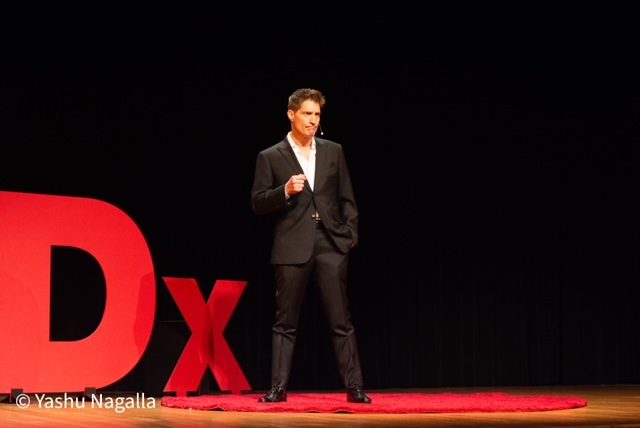In a career spanning decades, actor, Emmy-winning producer, and author Sean Kanan knows all too well the pressures of trying to conform to an idealized standard of physical appearance. The charismatic actor, known for his roles in Karate Kid III, Cobra Kai, General Hospital, and The Bold and the Beautiful, Kanan has drawn from his own experience with the toxic culture of body shaming and shares his strategies for silencing critics and self-empowerment in this exclusive interview. One of Kanan’s most popular roles is that of karate’s bad boy and bully, Mike Barnes, in the Karate Kid III film, making Kanan’s powerful message of building resilience and personal accountability as a motivational speaker and anti-bullying advocate all the more poignant.
Photo by Raquel Krelle
As a motivational speaker, particularly during your recent TedX Talk on “How to be the hero of your own story,” and your talks for Boo2Bullying, a non-profit focused on youth empowerment and suicide prevention, you tackle themes of toxic body shaming and give actionable strategies. As one of your most iconic roles is that of a bully, how did this come to be something you speak so passionately about?
When invited to contribute to this article on body shaming, I found myself reflecting on my journey with weight and self-image.
As a child, I struggled significantly with body issues, particularly grappling with gynecomastia—a condition characterized by excess fat in the breast tissue often caused by a hormonal imbalance. Bodybuilders disparagingly refer to this condition as “bitch tits.” For years, my childhood was overshadowed by toxic shame, humiliation, and self-loathing.
I quickly became a frequent target for bullies while remaining invisible to my peers. The torment manifested as cruel nicknames that only amplified my internal struggles and deepened my feelings of inadequacy. I vividly recall an incident where an uncle made a disparaging comment about my appearance in front of my parents, who attempted to silence him.
In that moment, my adolescent mind clung to the hope that my parents were somehow oblivious to what was so painfully apparent to everyone else. Unfortunately, that was not the case, and the psychic scars from that moment still linger.
Body shaming often comes from those closest to us; well-intentioned comments can easily morph into judgment and criticism. This distortion creates an environment rife with shame, humiliation, and alienation—feelings no one should have to endure.
At twelve, I took my first steps toward change and persuaded my parents to enroll me in Weight Watchers, leading to significant weight loss. However, I still faced the daunting challenge of undergoing multiple surgeries to correct my gynecomastia, an experience fraught with severe and painful postoperative complications.
Photo courtesy of Sean Kanan.
Pursuing a career in acting, an extremely image-driven profession, with these experiences in your childhood, must have been challenging.How did you deal with negative comments as an adult?
Fast forward several decades, and I had built a successful acting career, yet I found myself grappling with weight issues once more. In 2014, I reprised my role as AJ Quartermaine on General Hospital and became painfully aware of the extra weight I had gained since my last appearance on the show nearly thirty years prior. The pressure to lose it quickly was intense, magnified by comments from both producers and viewers about my appearance. It was impossible to ignore the harsh reality that my weight had become a subject of public scrutiny, fueled not just by my employer but also by critical remarks in online chat rooms.
To my dismay, I soon received a new script that included dialogue from another character commenting on how my character had gained thirty-five pounds since their last encounter.
I didn’t see myself as a victim; I understood that my appearance directly impacted my professional responsibilities, and I accepted this reality. The urgency to lose weight was driven by the anxiety that my career might be jeopardized.
Unfortunately, the ugly reality of body shaming only intensified my internal struggle, fomenting deep resentment towards myself and the world at large. Ironically, this resentment became a catalyst for change, propelling me into action. Ultimately, through determination and lifestyle changes, I successfully lost over fifty pounds and have managed to maintain that weight loss.
How do you feel your own experiences have impacted you as a motivational speaker and author?
I share my story to emphasize that I’m not an outside observer commenting on a social issue.
I come from a place of empathy and lived experience. Yet, this article is not about me; it is about the broader implications and damaging consequences of body shaming and the importance of fostering a supportive and inclusive environment for all individuals, irrespective of size or shape.
Body shaming, much like other forms of prejudice, is a learned behavior. But where does this mindset originate? One possible source can be traced back to the classical period of ancient Greek sculpture, where perfectly proportioned alabaster statues celebrated physical ideals.
These representations influenced cultural perceptions, planting the seeds that have grown into today’s societal expectations surrounding appearance. Today, these ideals are vividly illustrated in the filtered images saturating social media and the Photoshopped covers of magazines. The distinction between what is aspirational and what is utterly unattainable has become increasingly blurred, leading many to experience feelings of inadequacy.
Like most of life’s challenges, the solution is simple but not easy and requires action. It begins with taking responsibility.
Society needs to move away from toxic shame that judges people based on their appearances and instead focus on encouraging healthy lifestyles and building a culture that celebrates positive body image. However, society is not a monolithic entity; it is composed of individuals like you and me. Each of us has a role to play in how we communicate about body image. While few people deliberately express themselves with cruelty, many act thoughtlessly, neglecting to consider that excessive weight can be influenced by medication or underlying health issues, rather than simply a lack of discipline or commitment.
Civility and empathy should be our defaults, rather than judgment and condemnation. It’s essential to recognize that words hold power and can leave lasting, harmful effects.
Photo courtesy of Sean Kanan.
Your talks and your Way of the COBRA series of motivational self-help books have a distinct focus on accountability, proactive self-improvement, and strategies on how to achieve personal growth. How do you balance this with self-acceptance in the face of body shaming?
On the other side of this issue, individuals grappling with non-medical weight-related challenges must also bear personal responsibility. This includes avoiding a victim mentality and the misconception that societal indifference is the sole problem. Instead, they should focus on adopting a healthy lifestyle that incorporates regular physical activity and mindful nutritional choices.
These efforts should be for their well-being, not merely to meet external expectations. Embracing this attitude fosters a more holistic and empowering approach to body image and health. Rather than focusing on results such as inches lost and pounds shed, focus on creating a bulletproof process through healthy lifestyle choices. The results will come.
The human form comes in many varieties.
Not everyone who has a healthy body looks like a Versace model. Some individuals carrying excess weight are healthy. But be honest with yourself. If your medical labs indicate a weight-related problem, do something about it.
If you lack confidence and aren’t happy with how you look or feel, take action. Do it for yourself and your loved ones.
We live in the real world, which can be harsh. Don’t allow the haters and critics to dictate how you feel about yourself. If you encounter body shaming, flip the script.
Use it as fuel to drive you toward the life you want to live. Maybe you have tried in the past to change your lifestyle. Maybe you haven’t succeeded. So what?
Get knocked down seven times, get up eight. You may not be able to control the negative voices from outside, but you can control the voice inside your head. Ignore the ones that ask, “What if you fail?” Listen to the one that says, “What if you fly?”
Sean Kanan is a motivational speaker and actor known for his breakout role of Mike Barnes in the Karate Kid III film and Cobra Kai (Netflix), Deacon Sharpe on The Bold and the Beautiful, AJ Quartermaine on General Hospital and is the executive producer and star of the award-winning series Studio City (available on Amazon Prime and Tubi). He is also the author of the wildly popular series of award-winning books Way of the COBRA, Welcome to the Kumite, and Way of the COBRA Couples, available on Amazon and at WayoftheCOBRA.com. His latest venture is as an entrepreneur and founder of Bad Boy Hot Sauce, available at badboyeats.com.
You can follow Sean Kanan on X at @seankanan and on Instagram at @sean.kanan
About the author: Charlene Bazarian is a fitness and weight loss success story after losing 96 pounds. She mixes her no-nonsense style of fitness advice with humor on her blog at Fbjfit.com and on Facebook at FBJ Fit and Instagram at @FBJFit.
Disclaimer
The Content is not intended to be a substitute for professional medical advice, diagnosis, or treatment.
Always seek the advice of your physician or other qualified health provider with any questions you may have regarding a medical condition.
Disclaimer: This story is auto-aggregated by a computer program and has not been created or edited by jennertrends.
Publisher: Source link













